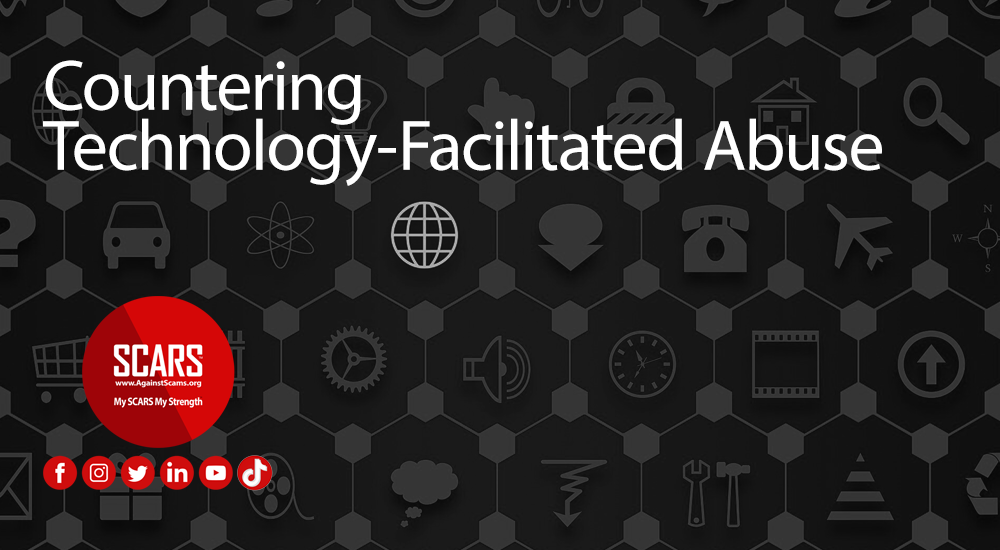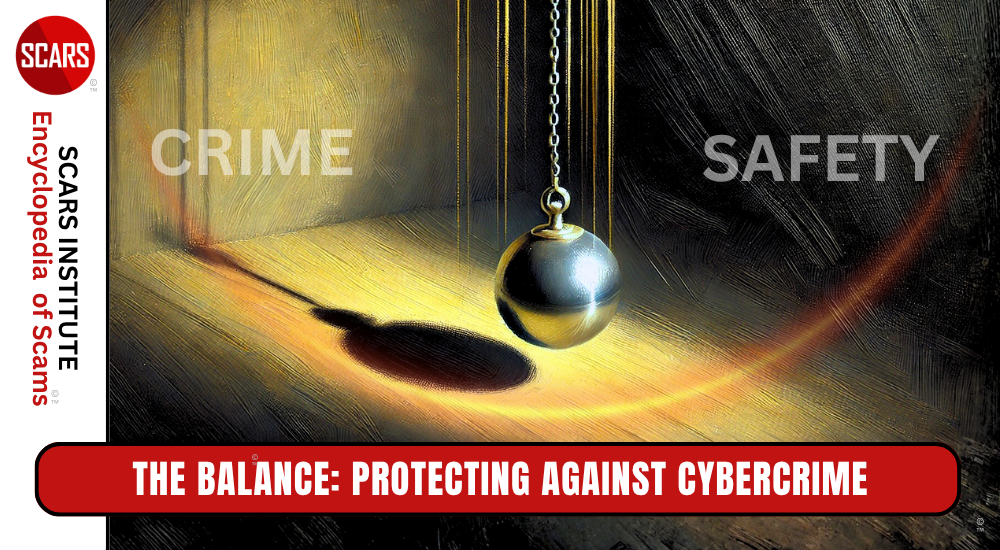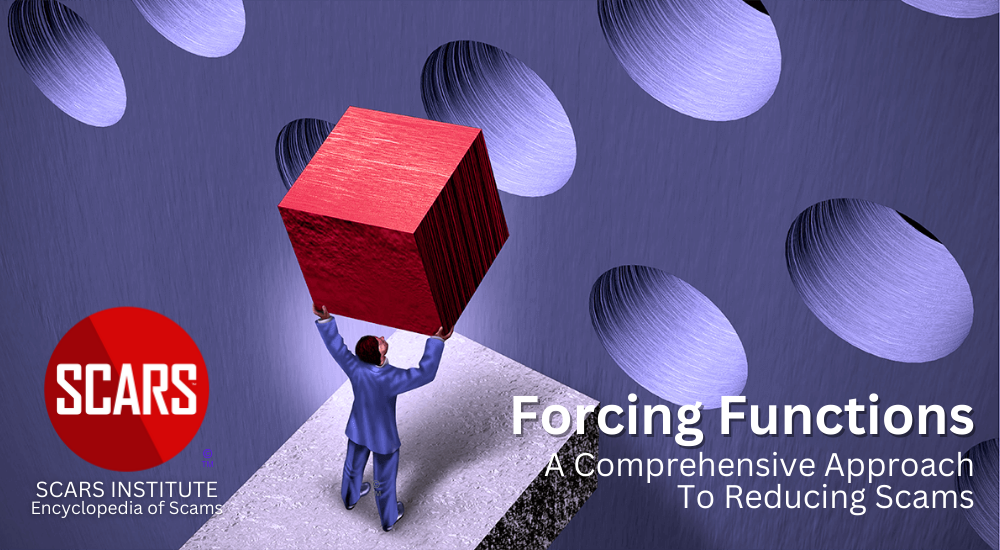
SCARS Institute’s Encyclopedia of Scams™ Published Continuously for 25 Years

Countering Technology-Facilitated Abuse
Criminal Justice Strategies for Combating Nonconsensual Pornography, Sextortion, Doxing, and Swatting
A RAND® Corporation Research Report
Technology-Facilitated Abuse (TFA)
by Amanda R. Witwer, Lynn Langton, Michael J. D. Vermeer, Duren Banks, Dulani Woods, Brian A. Jackson
INTRODUCTION:
The proliferation of websites, social media platforms, and applications that enable users to interact virtually and often anonymously has given rise to new modes and methods of perpetrating harassment, abuse, and other criminal behaviors that compromise victims’ privacy and safety. These types of acts, termed technology-facilitated abuse (TFA), can involve the use or distribution of the victim’s personal information, which compromises the victim’s privacy and poses a threat to their safety. Efforts to combat these profoundly harmful acts are limited by a lack of awareness among the general public and criminal justice practitioners, impediments to investigation and adjudication presented by digital spaces, and laws and policies that have not kept pace with advancements in digital technologies. To examine this issue, RTI International and the RAND Corporation convened an expert workshop. The participants discussed the challenges, opportunities, and complexities faced by law enforcement and criminal justice practitioners in TFA cases. Using these discussions, the panel members identified and ranked needs for the public, law enforcement, and criminal justice practitioners to successfully identify and prosecute TFA cases. This report provides the prioritized list of needs and accompanying context from the discussion that resulted from this effort.
KEY FINDINGS
Raising awareness about the prevalence, costs, and harms of TFA is critical
- Participants suggested developing a conceptual framework of TFA behaviors and providing school-based public education around internet safety. Participants determined that legislation, measurements of the harms and costs of TFA behaviors, and prioritization by leadership are key to ensuring that TFA cases are prioritized by law enforcement and courts.
Approaches to investigating TFA cases should acknowledge the harm done to victims
- Increased coordination among law enforcement, lawyers, victims’ rights organizations, and service providers would encourage TFA victims to come forward with their cases and would empower them to make decisions about what path of recourse to take.
Criminal justice practitioners often lack the tools to address TFA cases effectively
- Standards and training around the identification, collection, and processing of digital evidence would enable law enforcement to conduct thorough investigations of Technology-Facilitated Abuse (TFA) crimes. Instituting statutes specific to TFA behaviors, accompanied by sentencing guidelines that acknowledge the harms to and vulnerabilities of TFA victims, would allow prosecutors to ensure that TFA sentences are commensurate with harm and that victims’ needs are met.
Participants reported the critical importance of efforts to mitigate the significant, irreparable, and persistent harm experienced by Technology-Facilitated Abuse (TFA) victims
- There is a need for research to evaluate the extent to which existing remedies mitigate harm, tools for the early detection of TFA, and methods for mitigating the effects of TFA and empowering victims.
Deterrence must be at the core of efforts to address TFA
- Statutes that criminalize Technology-Facilitated Abuse (TFA) behaviors might serve as a deterrent for some types of TFA perpetrators, although research is needed to better understand TFA perpetrators and the effectiveness of deterrence approaches.
RECOMMENDATIONS
- Research the cost of doxing and the costs of emergency responses to swatting and associated risks to society.
- Develop basic primary education for kids and parents about consent and the risks and consequences of sharing information online.
- Conduct a survey about Technology-Facilitated Abuse (TFA) to collect data on victim response, effects on victims, and secondary injuries or personal harm.
- Develop a conceptual framework or taxonomy for definitions of TFA so that criminal justice practitioners can recognize it and respond.
- Identify approaches to incentivize law enforcement and prosecutors to prioritize TFA cases.
- Develop training materials for law enforcement about TFA, the impact on victims, and the associated statutes.
- Conduct research to understand the characteristics of perpetrators and what deterrents might be effective.
- Require basic training around digital evidence among first responders.
- Disseminate existing training regarding digital evidence and develop accreditation standards.
- Conduct training on interviewing techniques for delicate or traumatic situations.
- Establish TFA investigative teams or units.
- Designate specific resources for TFA so that TFA investigations do not take resources away from other areas.
- Conduct research and gather data to evaluate the harm of TFA and the effectiveness of remedies.
- Develop methods and resources to mitigate the effects of TFA and support and empower victims.
- Promote coordination about what the victim wants, their fears, and their experience among law enforcement, crisis providers, and lawyers.
THE FULL RAND REPORT
You may download your own copy of the report for personal, non-commercial use only – making it easier to read offline. Reproduction online is prohibited.
RESOURCES
- Technology-Facilitated Abuse (vawnet.org)
- What is technology-facilitated abuse? | eSafety Commissioner
- Technology-Facilitated Abuse – Safe Steps Family Violence Response Centre
TAGS: SCARS, RAND Corporation Report, Cybercrime Research, Technology-Facilitated Abuse (TFA), digital evidence, Online Abuse, Sextortion, Doxing, Information About Scams, Anti-Scam, Scams, Scammers, Fraudsters, Cybercrime, Crybercriminals, Romance Scams, Scam Victims, Online Fraud, Online Crime Is Real Crime, Scam Avoidance
SCARS™ Team
Society of Citizens Against Relationship Scams Inc.
A Worldwide Crime Victims Assistance Nonprofit Organization
Visit: www.AgainstScams.org
Contact Us: Contact@AgainstScams.org
PLEASE SHARE OUR ARTICLES WITH YOUR FRIENDS & FAMILY
HELP OTHERS STAY SAFE ONLINE – YOUR KNOWLEDGE CAN MAKE THE DIFFERENCE!
-/ 30 /-
What do you think about this?
Please share your thoughts in a comment below!
Table of Contents
- Criminal Justice Strategies for Combating Nonconsensual Pornography, Sextortion, Doxing, and Swatting
- Technology-Facilitated Abuse (TFA)
- INTRODUCTION:
- KEY FINDINGS
- RECOMMENDATIONS
- THE FULL RAND REPORT
- RESOURCES
- New U.S. Law – S.3643 – 118th Congress – Will Dramatically Impact Scammers and Terrorists – 2026
- How Scam Survivors Can Survive Valentine’s Day – 2026
- U.S. Veterans Benefits Scams – 2026
- New AI Voice Cloning Phone Scams – 2026
- An Essay on Justice and Money Recovery – 2026
- Virtual Kidnapping & Extortion – Proof of Life Images or Videos – 2026
- FIND MORE SCAM NEWS
SCAMCRIME.COM - FIND SCAMMER PHOTOS ON
SCARSONLINE.ORG - JOIN US ON FACEBOOK
CLICK HERE
LEAVE A COMMENT?
Recent Comments
On Other Articles
- Arwyn Lautenschlager on Love Bombing And How Romance Scam Victims Are Forced To Feel: “I was love bombed to the point that I would do just about anything for the scammer(s). I was told…” Feb 11, 14:24
- on Dani Daniels (Kira Lee Orsag): Another Scammer’s Favorite: “You provide a valuable service! I wish more people knew about it!” Feb 10, 15:05
- on Danielle Delaunay/Danielle Genevieve – Stolen Identity/Stolen Photos – Impersonation Victim UPDATED 2024: “We highly recommend that you simply turn away form the scam and scammers, and focus on the development of a…” Feb 4, 19:47
- on The Art Of Deception: The Fundamental Principals Of Successful Deceptions – 2024: “I experienced many of the deceptive tactics that romance scammers use. I was told various stories of hardship and why…” Feb 4, 15:27
- on Danielle Delaunay/Danielle Genevieve – Stolen Identity/Stolen Photos – Impersonation Victim UPDATED 2024: “Yes, I’m in that exact situation also. “Danielle” has seriously scammed me for 3 years now. “She” (he) doesn’t know…” Feb 4, 14:58
- on An Essay on Justice and Money Recovery – 2026: “you are so right I accidentally clicked on online justice I signed an agreement for 12k upfront but cd only…” Feb 3, 08:16
- on The SCARS Institute Top 50 Celebrity Impersonation Scams – 2025: “Quora has had visits from scammers pretending to be Keanu Reeves and Paul McCartney in 2025 and 2026.” Jan 27, 17:45
- on Scam Victims Should Limit Their Exposure To Scam News & Scammer Photos: “I used to look at scammers photos all the time; however, I don’t feel the need to do it anymore.…” Jan 26, 23:19
- on After A Scam, No One Can Tell You How You Will React: “This article was very informative, my scams happened 5 years ago; however, l do remember several of those emotions and/or…” Jan 23, 17:17
- on Situational Awareness and How Trauma Makes Scam Victims Less Safe – 2024: “I need to be more observant and I am practicing situational awareness. I’m saving this article to remind me of…” Jan 21, 22:55
ARTICLE META
Important Information for New Scam Victims
- Please visit www.ScamVictimsSupport.org – a SCARS Website for New Scam Victims & Sextortion Victims
- Enroll in FREE SCARS Scam Survivor’s School now at www.SCARSeducation.org
- Please visit www.ScamPsychology.org – to more fully understand the psychological concepts involved in scams and scam victim recovery
If you are looking for local trauma counselors please visit counseling.AgainstScams.org or join SCARS for our counseling/therapy benefit: membership.AgainstScams.org
If you need to speak with someone now, you can dial 988 or find phone numbers for crisis hotlines all around the world here: www.opencounseling.com/suicide-hotlines
A Note About Labeling!
We often use the term ‘scam victim’ in our articles, but this is a convenience to help those searching for information in search engines like Google. It is just a convenience and has no deeper meaning. If you have come through such an experience, YOU are a Survivor! It was not your fault. You are not alone! Axios!
A Question of Trust
At the SCARS Institute, we invite you to do your own research on the topics we speak about and publish, Our team investigates the subject being discussed, especially when it comes to understanding the scam victims-survivors experience. You can do Google searches but in many cases, you will have to wade through scientific papers and studies. However, remember that biases and perspectives matter and influence the outcome. Regardless, we encourage you to explore these topics as thoroughly as you can for your own awareness.
Statement About Victim Blaming
SCARS Institute articles examine different aspects of the scam victim experience, as well as those who may have been secondary victims. This work focuses on understanding victimization through the science of victimology, including common psychological and behavioral responses. The purpose is to help victims and survivors understand why these crimes occurred, reduce shame and self-blame, strengthen recovery programs and victim opportunities, and lower the risk of future victimization.
At times, these discussions may sound uncomfortable, overwhelming, or may be mistaken for blame. They are not. Scam victims are never blamed. Our goal is to explain the mechanisms of deception and the human responses that scammers exploit, and the processes that occur after the scam ends, so victims can better understand what happened to them and why it felt convincing at the time, and what the path looks like going forward.
Articles that address the psychology, neurology, physiology, and other characteristics of scams and the victim experience recognize that all people share cognitive and emotional traits that can be manipulated under the right conditions. These characteristics are not flaws. They are normal human functions that criminals deliberately exploit. Victims typically have little awareness of these mechanisms while a scam is unfolding and a very limited ability to control them. Awareness often comes only after the harm has occurred.
By explaining these processes, these articles help victims make sense of their experiences, understand common post-scam reactions, and identify ways to protect themselves moving forward. This knowledge supports recovery by replacing confusion and self-blame with clarity, context, and self-compassion.
Additional educational material on these topics is available at ScamPsychology.org – ScamsNOW.com and other SCARS Institute websites.
Psychology Disclaimer:
All articles about psychology and the human brain on this website are for information & education only
The information provided in this article is intended for educational and self-help purposes only and should not be construed as a substitute for professional therapy or counseling.
While any self-help techniques outlined herein may be beneficial for scam victims seeking to recover from their experience and move towards recovery, it is important to consult with a qualified mental health professional before initiating any course of action. Each individual’s experience and needs are unique, and what works for one person may not be suitable for another.
Additionally, any approach may not be appropriate for individuals with certain pre-existing mental health conditions or trauma histories. It is advisable to seek guidance from a licensed therapist or counselor who can provide personalized support, guidance, and treatment tailored to your specific needs.
If you are experiencing significant distress or emotional difficulties related to a scam or other traumatic event, please consult your doctor or mental health provider for appropriate care and support.
Also read our SCARS Institute Statement about Professional Care for Scam Victims – click here to go to our ScamsNOW.com website.























Thank you for your comment. You may receive an email to follow up. We never share your data with marketers.